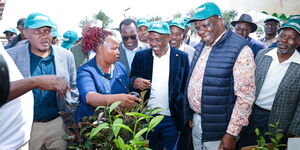The Kenya Bureau of Standards (KEBS) has ordered for the immediate withdrawal of 28 sanitiser brands from shop shelves following a crackdown.
The bureau tasked with ensuring the highest quality of standards on April 8, revealed that countless of innocent Kenyans may have been exposed to the deadly Coronavirus, as the 28 listed sanitisers did not meet the set quality mark, going on to issue the standards that need to be met when it comes to sanitiser.
"Some are substandard with low alcohol content, which is a high risk to the user at a time when we are battling a pandemic," one of the agency's market surveillance officers disclosed.
"We have companies with no address, which makes it hard to track them down, that is why we chose the route to target the outlets and stop the sale of these products," he further stated.
Five of the companies linked with the products were completely unknown, with KEBS finding no existing physical address linking the product to any manufacturer.
The companies listed as responsible for the 28 sanitisers following the clampdown were Elex EA products, Inmed Labs, Afrego Kenya Limited, Flame Tree Africa, Dhahabu Oils, Solid Base Chemicals, Vicente Gaps Industries, Hygiene Chemical Ltd and A&J London.
In a letter sent to the Retail Association of Kenya, KEBS Market Surveillance Director Peter Kaigwara vowed to take action against any retailer who was found stocking any of the listed sanitisers that pose a great risk to the population during this pandemic.
"Any person found offering for sale products that do not comply with the Kenyan standards shall be prosecuted. Notify all your members to remove from the shelves any products that do not have a valid standardisation mark," reads the letter in part.
Kaigwara also revealed that standardisation marks placed on all products within the market have a unique code that could be easily verified by sending the identifying code to 20023 on SMS.
"A concentration of 60 % to 95 % alcohol in hand sanitising product is recommended. However, there are also non-alcohol based hand sanitizers which can be effective in killing germs. For instance, Benzalkonium Chloride (BAC) has been proven effective in killing 99.9 % of germs," a document on the specifications regarding sanitisers shared by Kebs, reads in part.
Health Cabinet Secretary Mutahi Kagwe identified regular sanitisation by the wash of hands using soap under running water for at least 20 seconds or the use of alcohol-based sanitisers as one of the key ways to steer clear of Covid-19.












